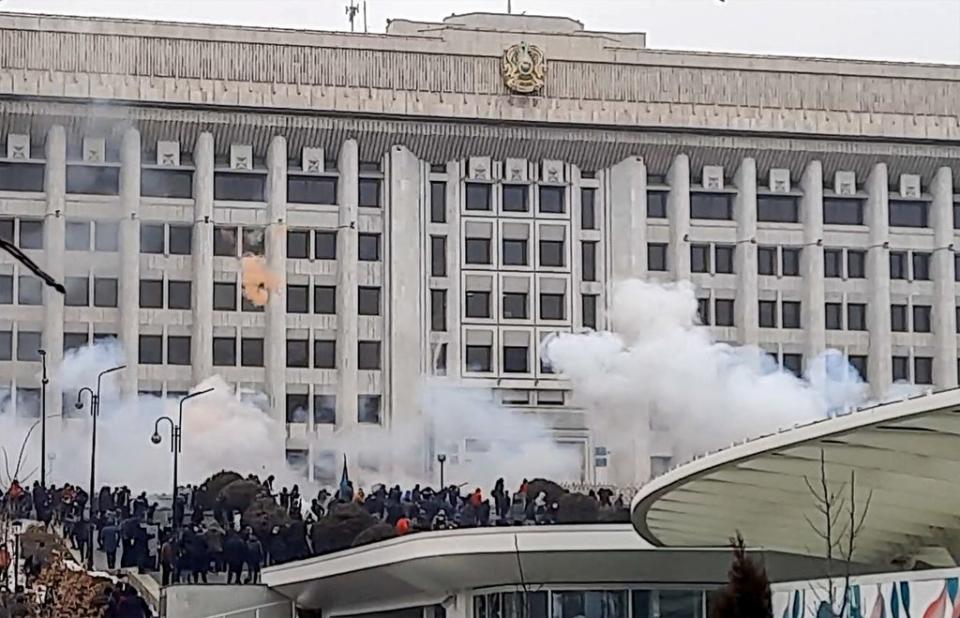Russian troops arrive in Kazakhstan to quell unrest as police say officer beheaded
- Oops!Something went wrong.Please try again later.
Russian paratroopers have arrived in Kazakhstan after the country’s president asked for help in controlling violent protests that initially erupted over fuel prices but grew into calls for wider political reform.
Moscow’s “peacekeeping forces” were sent to quell the unrest in the oil-rich country by the Collective Security Treaty Organisation (CSTO), a partnership between Russia and former Soviet states, including Armenia, Belarus and Kyrgyzstan.
The move comes as dozens of police and civilians have reportedly been killed in Almaty, the Central Asian nation’s largest city, in the biggest protests to hit the country since it gained independence in 1991. A nationwide state of emergency was declared on Wednesday, shortly after the government resigned over the backlash.
Kazakh police said they had “eliminated” dozens of protesters who allegedly tried to storm their offices overnight, while 18 police officers have died in the disturbances so far, with one found beheaded, according to the interior ministry.
A total of 2,298 demonstrators have been detained so far, it added.

More than 1,000 people have been injured during the protests and 400 hospitalised, Russian TASS news agency reported.
Amid the rising death toll, demonstrators and security forces clashed in Almaty on Thursday, the third day of unrest there. Soldiers shot at protesters and cars in the city’s main square, according to TASS.
The previous day, rioters managed to gain entry to the presidential residence and the mayor’s office in Almaty, setting both on fire.
Later on Wednesday, anti-government protesters took control of Almaty airport, before it was recaptured by security forces and flights resumed.
The clashes started on Sunday over the near-doubling of prices for a type of liquid petroleum gas widely used as fuel for vehicles, but demands and concerns have since reflected the wider political and economic discontent among people in the oil-rich country.
Particular anger has been focused against Nursultan Nazarbayev, who ruled Kazakhstan between 1991 and 2019, but who still retains significant power in a country that has been under the rule of one party since it gained independence from the Soviet Union three decades ago.
Many demonstrators chanted “old man go,” in an apparent reference to Mr Nazarbayev, who was stripped of his role governing the Kazakh Security Council by the current president Kassym-Jomart Tokayev on Wednesday.
As the violence escalated, Mr Tokayev sought help from the Collective Security Treaty Organisation (CSTO), claiming the unrest was led by unnamed “terrorist bands”.
Earlier, the president had vowed to enforce harsher measures to quash the protests, introducing an overnight curfew and restricting the movement of Kazakh people. Meanwhile, the internet is largely down across the country.
The US condemned the violence on Wednesday, calling for restraint from protesters and the authorities. The State Department described Kazakhstan as “a valued partner”, urging the country "to respect and defend constitutional institutions, human rights, and media freedom, including through the restoration of internet service”.
The British foreign secretary Liz Truss told parliament on Thursday that the UK government is also “concerned” by the situation in Kazakhstan and is watching developments closely. “We condemn the acts of violence and destruction of property in Almaty and we will be coordinating further with our allies on what further steps we should take,” she added.
Elsewhere, Turkish president Tayyip Erdogan called his Kazakh counterpart to express his support, telling Mr Tokayev that he would offer the country “all forms of technical information and experience” if necessary. He also expressed his hope that the crisis would be brought to an end through dialogue.
As a result of the unrest, German airline Lufthansa announced on Thursday that it would not be offering regular flights to Almaty. "Due to further developments, Lufthansa has now decided not to offer any more regular flights to Almaty until further notice," it said in a statement.

